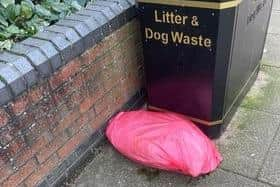Dozens of birds, including swans, found dead in Doncaster
and live on Freeview channel 276
Free Press reader Melanie Smith of Wadworth got in touch after seeing five swans dead at the city’s Lakeside.
She was more distressed having seen that the birds were bagged up and left at the side of litter bins for collection.
Advertisement
Hide AdAdvertisement
Hide AdShe said: “I’ve been informed that it’s bird flu that’s killing them.


“However still not acceptable being let in red bags like trash at the side of the waste bins.”
We contacted the Department for Environment, Food and Rural Affairs who said that in Doncaster they had received 80 reports of deaths, totalling 146 birds – this breaks down as gulls 8, birds of prey 8, swans 11, ducks 15 and one goose.
A spokesman said: “In Great Britain members of the public are encouraged to report findings of dead wild birds using the online reporting system or by calling the Defra helpline (03459 33 55 77).
Advertisement
Hide AdAdvertisement
Hide Ad“APHA (Animal and Plant Health Agency) triages reports and does not collect all birds. They adjust the collection thresholds for dead wild birds for different species to increase or decrease the sensitivity of surveillance.
“The Animal and Plant Health Agency (APHA) carries out year-round surveillance of dead wild birds submitted via public reports and warden patrols as part of its wild bird surveillance programme.
“APHA publishes a list of all wild birds that have tested positive for the disease in Great Britain, the list is updated weekly and is available
Advertisement
Hide AdAdvertisement
Hide Ad“We are unable to comment on any testing or reports that are not listed at this site as the results will not yet be ready for publication.”
They added: “APHA have also launched a new interactive map of reported wild bird mortality and findings of avian influenza virus (bird flu) in wild birds and wild mammals and an interactive data dashboard of findings of avian influenza virus in wild birds.
“If you have reported a dead wild bird online or via the helpline (03459 33 55 77), you can now check the status of your wild bird report by entering the location of your report or your Defra reference number (prefixed by WSF- or REP-) in the maps search box.
“Results from wild bird testing help us to tell where the disease is distributed across the country, as well as understand the risk posed to poultry and other captive birds, to help us work with farmers to prevent the disease being transferred into the captive bird population.
Advertisement
Hide AdAdvertisement
Hide Ad“ Wild birds are susceptible to a range of diseases and injuries and not all dead birds will have been infected with avian influenza.
“Do not touch or pick up any dead or visibly sick birds that you find.
“Wash your hands thoroughly with soap and water if you touch wild bird faeces or feathers or after feeding wild birds.”
We have also approached the City of Doncaster Council for comment and are awaiting a response.
Advertisement
Hide AdAdvertisement
Hide Ad*Avian influenza naturally spread among wild aquatic birds worldwide and can infect domestic poultry and other bird and animal species. Bird flu viruses do not normally infect humans. However, sporadic human infections with bird flu viruses have occurred.